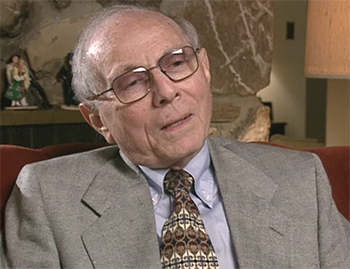
Henry Rosmarin
Watch Henry Rosmarin’s full testimony from the Visual History Archive as part of Comcast’s Days of Remembrance: PastFORWARD broadcast April 15-June 1, 2015.
The sound of a harmonica usually brings to mind playfulness, joy, a sense of merriment. For Henry Rosmarin, it is also conjures the darkest chapter of his life, when his talent for music earned him favor with a Nazi commandant and kept him alive in a German concentration camp.
Rosmarin was born in Poland to an Orthodox Jewish family. His parents were fans of opera, but when Henry asked for a piano they could not afford one. Instead, they bought him a harmonica, which he began learning at nine years old.
When the war began in 1939, Henry was in eighth grade. From the Czeladz ghetto in Poland, he was deported to Karwin concentration camp in Czechoslovakia and then to Dyhenfurth camp in Germany. By this point, his family, including his parents and brother Max, had been split up.
At Dyhenfurth, he was made to work clearing roads, in cold and snowy conditions. He was 17 and weighed 90 pounds. But one night, the commandant called him from his barrack and told Henry to play a song on his harmonica. Terrified, Henry asked what he should play, and the commandant told him, “Schubert.”
Amazingly, Henry was able to play Schubert’s difficult “Serenade,” and the commandant was satisfied. From then on, Henry was assigned to the kitchen, so he could perform during the SS guards’ dinner. He was able to sneak scraps of food, which gave him desperately needed strength.
After a few months in Dyhenfurth, Henry survived two death marches to Fünfteichen and Buchenwald before he escaped and hid with local farmers until liberation in May 1945. His parents had been killed, but he reunited with Max and married his childhood sweetheart Jadzia. They moved to Los Angeles and had two sons, and Henry became a successful businessman.
In the years before his death in 2001 at age 75, Henry became a well-known figure in the local Holocaust survivor community. In addition to giving his testimony to USC Shoah Foundation, he also volunteered in its research department, and he frequently spoke about his experiences to schools and other groups. Of course, he always brought along his harmonica and played his favorite songs at his speaking engagements. He was especially beloved by students at Beverly Hills High School, as reported in a piece by the Los Angeles Times just three months before he died.